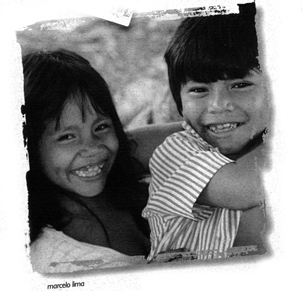 |
Interdisciplinary
Journal on Human Development, Culture and Education
Revista Interdisciplinar de Desenvolvimento Humano, Cultura e Educação
ISSN: 1533-6476 |
| Tikunakids
/ Crianças Tikuna
Aldeia Filadelfia BenjaminConstant, Amazonas, Brasil photo (c) Marcelo Lima Editorial
policy /
Review
Essays /
Notas
de Leitura
Books
received /
general
index
Sign
our /
Leia
o nosso /
READER'S
FORUM
|
VOLUME 1 Number 3,
June, 2002
In this issue cultural psychologist Carl Ratner explores the methodological, theoretical and political dimensions of the discipline of Cultural Psychology from the perspective of activity theory and of cultural historical psychology as developed from the insights, ideas and research of Vygotsky and his collaborators in the early part of the 20th Century. That the Cultural Psychology of the late 20th Century was greatly influenced by the discovery or re-discovery of Vygotsky's works is largely agreed. Less understood is the theoretical foundation of Vygotsky's cultural-historical psychology in a comprehensive view of human beings as socio-historical beings, as expressed in the works of Marx. Indeed, much less understood by some well known present day cultural psychologists, readers and /or interpreters of Vygotsky, is the fact that the works of Vygotsky present us with the early delineations of a comprehensive theory of psychological development that refuses both the tacit idealism and methodological individualism of modern day "scientific psychology", in its positivist and phenomenological versions, and the "sociologism" and "historicism" of some vulgar versions of historical materalism. The issue, as Ratner emphasizes here and in many of his writings, is the immediately political dimension of scientific practice, and therefore of psychology itself. A dimension, we may point out, perhaps only disclosed theoretically by a laborious mediation of theory by practice, that is, by following its particular inscriptions, its specific formative processes, in the hard matter of social reality (ultimately in the reality of structural social conflict, that is, class-struggle). The sort of question that can be viewed as a source of embarassment, and rapidly denied-dismissed as such, or as a source of real problems, important questions and real difficulties that form the stuff of the workings of scientific knowledge, of the passion to know: sapere aude! The Editor
Cultural
Psychology:Theory & Method - Introduction
What Is Psychology
of Liberation? It is Cultural Psychology
Qué
es la psicología de liberación? es psicología cultural
Book review Art History
as Cultural Psychology
copyright
(c) 2002 Centro de Estudos e Pesquisas Armando de Oliveira
Souza CEPAOS
endereço
phone
+ fax: (55) 11 - 50837182 Brasil
|
